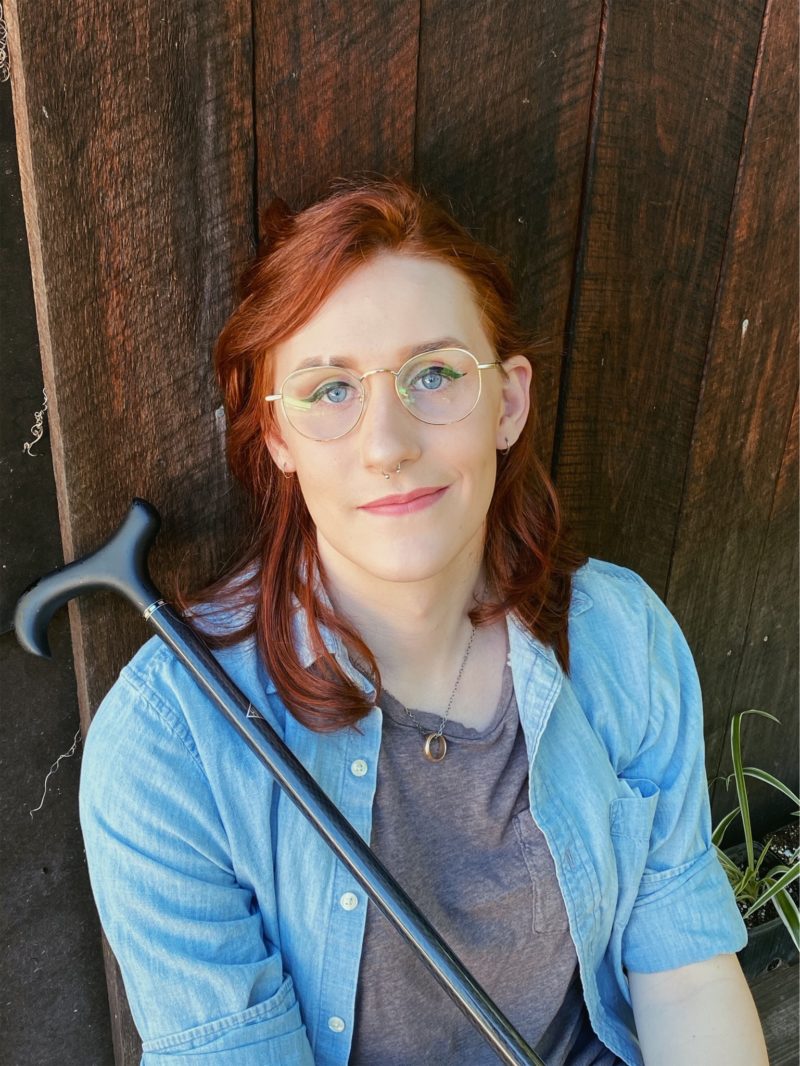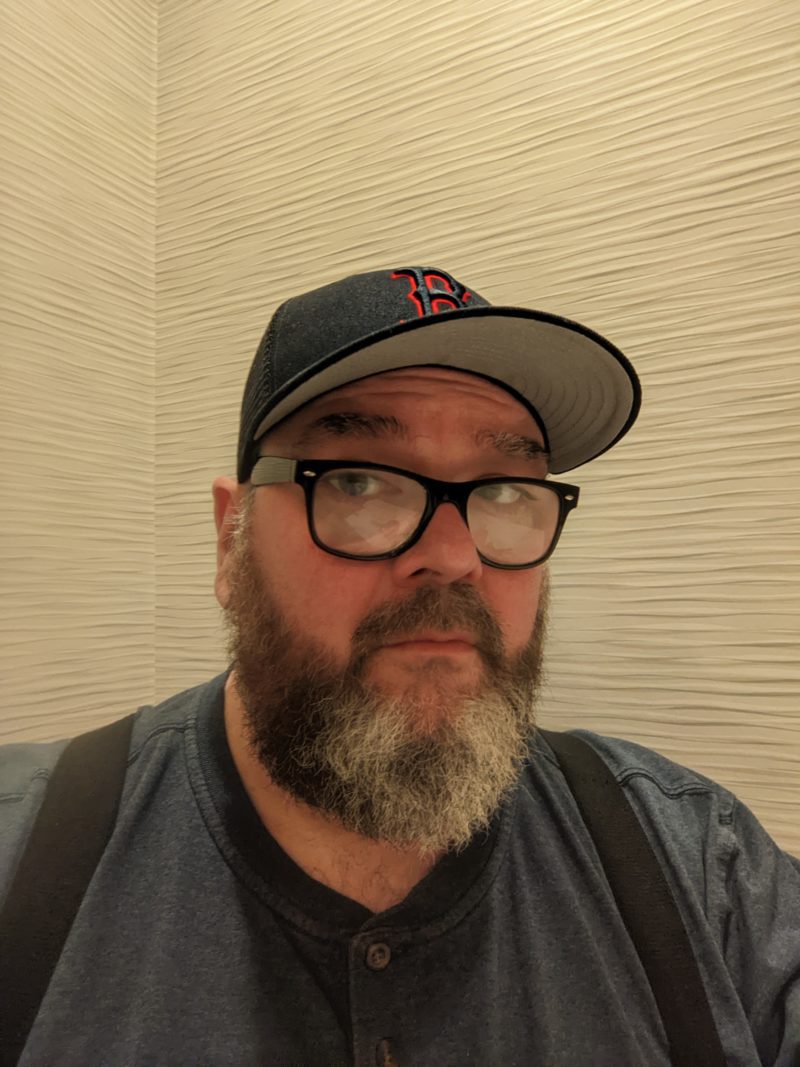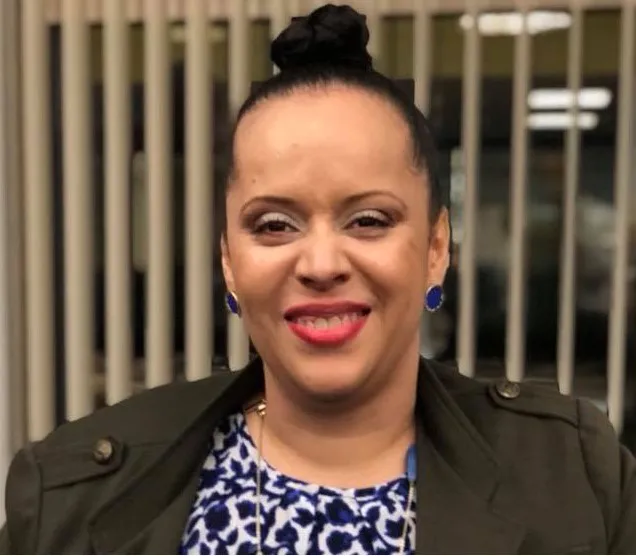For the last two years, Mass Poetry has been bringing you the “Hard Work of Hope,” a series of poems from members of our community that tell the story of the pandemic and all its ripple effects in our lives. But we cannot tell the full story without hearing from members of the disabled community. From increased risk of poor outcomes from the disease itself, reduced access to routine health care, and the adverse social impacts and barriers to inclusion during efforts to mitigate the pandemic, the COVID-19 pandemic has disproportionately impacted people living with disabilities. This week we bring you six poets writing about being disabled in an ableist America, curated and introduced by Colin Killick, poet and Executive Director of Disability Policy Consortium, a statewide civil rights advocacy organization run by and for people with disabilities:
“For me, poetry, disability, and activism are deeply intertwined. In college, I wrote my first slam poem—a description of my neurological disorder on my terms—when I got tired of having to explain myself over and over using the standard medical language I had been given. When I came to Boston, I found both a deep local poetry scene and a disability community intensely engaged in the grassroots fight for access. I found a home in both, and learned especially from those who crossed into both communities; seeing Ryk McIntyre and Zeke Russell share incredible work about their own experiences with disability gave me the confidence to make my own disability a focal point of my work. In torrin a. greathouse’s “cripple-punk” pieces, I saw the power of poetry as a battle cry in the fight for a genuinely accessible world. Meanwhile, Heather Watkins opened my eyes to the history of intertwined ableism and racism in Boston and beyond, and showed me how to live as both an activist and poet in ways that reinforce each other. When I had the privilege of performing at the National Poetry Slam in 2015, the piece I was proudest to get to do was Three Generations, a pocket history of disability rights that explains just what we have accomplished in a country that has tried its hardest to get rid of us.
Poetry’s accessibility as a medium—the fact that it can be created without access to money, resources, and institutions—have made it a crucial means for disabled people to tell their own stories in a society in which we are systemically silenced. From Keith Jones’s Krip-hop anthems, to the elegies of the late, great Mark O’Brien, disabled poets have committed the revolutionary act of self-definition through their writing, and played a critical part in the building of the lifesaving force that is disability pride. Poetry can also be a crucial tool of advocacy, both by shining a light on critical issues and by training advocates in how to communicate effectively about emotionally wrenching subjects; I’ve been telling people for years that I learned to give legislative testimony by writing slam poems—both are three minutes long, and it’s almost as hard to grab the attention of state legislators as drunk bar patrons.
Yet the poetry community itself is a long way from being accessible; Boston is an incredible poetry city, but it is also one in which neither of the city’s longest running slam venues is wheelchair accessible. The only poetry shows in this city that I’ve ever seen have ASL interpreters are ones that disabled people were part of organizing. Seeing an organization like Mass Poetry putting together a folio and performance like this one is a major step in the right direction, and hopefully one that will be followed by disabled poets getting the spotlight they deserve on an ongoing basis.
Because of the ways in which poetry can motivate people to take action, each piece in this folio will be followed by a brief call to action, with a specific bill on an issue the poem speaks to. We urge everyone who reads this to reach out to their legislators and urge them to support this bill. If you can lend your time, your voice, and your story, you will have an impact. At Disability Policy Consortium, we and our allies quadrupled Massachusetts’ investment in providing affordable housing to low income people with disabilities and defeated discriminatory Crisis Standards of Care during the pandemic, through the power of people with disabilities showing up, speaking up, and refusing to accept being dismissed and diminished. No matter how you engage with these poems, I’m sure you will come away thinking about disability in new ways, and with an appreciation for the multitude of brilliant perspectives within our community.”
torrin a. greathouse
On Explaining to a Friend That Most Robots in Fiction Are Autistic-Coded
after Ros Seamark
They say each poem’s an engine w/ an animal heart, steady beat beneath the whir of gears;
each set of gears a mouth misshapen—parabolic jaw of grinding teeth. I grind my teeth ‘til
my tongue’s the world’s ugliest beach. White sand—weighted blanket for tongues to sleep.
I’m something like a poem, mess of metal & meat. I tic—a watch’s broken teeth. I flap, blink,
twitch, stim. Clockwork girl dressed in human skin.
Call to Action:
torrin a. greathouse’s piece speaks to the ways in which Autistic people–like those with all kinds of disabilities–are often perceived not as we actually are, but as stereotypes and stigmas suggest we are. This bias plays out across almost every facet of our lives, but one of the most damaging comes when people with disabilities try to become parents. Over and over, both family courts and state agencies have treated having a disability as synonymous with an inability to parent. From Deaf parents being questioned (often without ASL interpretation available) how they can raise a baby without being able to hear them cry, to physically disabled parents being presumed unable to keep up with a child, to intellectually disabled parents having their children taken away without any attempt to provide supports and accommodations, family law is often a minefield for members of our community. That’s why the Disability Police Consortium (DPC) is working to pass H.1711 and S.1083, “An Act prohibiting discrimination against adults with disabilities in family and juvenile court proceedings.” This legislation would require courts and the Department of Children and Families to determine if a parent’s disability causes actual harm to a child based on evidence, instead of simply presuming that their disability makes them unfit to parent.
Keith P. Jones
Wait
What does it mean to have to wait for your humanity to be recognized?
What does it mean to have to wait for your life to be valued by others?
What does it mean to have to wait for others to deal with you equal in your own life?
What does it mean do I have to wait for others to recognize their own humanity? We have tried for decades and decades to live in a world that wants us to wait… We have tried for decades and decades and decades to live in a world without heat…
But we must wait.
We have tried for decades and decades and decades to move in a way in which we are recognized, even for those who don’t love us…
But we wait.
We wait for intelligence to enter into one soul so they can see the value in others…
We wait for the earth to be recognized is the only place we have to call home…
We wait for doors to be made easy to open.
We wait for classrooms to embrace us fully.
We wait for love to find us and embrace us for the humans that we are.
We wait we wait we wait…
We have carried this weight on our shoulders for decades and decades
and decades…
This weight of hatred this weight of oppression this weight of ableism this weight of sexism this weight of misogyny this weight of racism this weight of depression this weight of despair…
So we wait.
We carry this weight as if it was a boulder made out of feathers.
We carried this week as if it is the most heaviest thing the universe has placed on the backs …
But we move remove with specific and determined intent …to not have to wait for our humanity to be realize or acknowledged.
So for those who wait at crosswalks with no curb cuts…
So for those who wait in the rooms crying because their identities are not being accepted…
So we wait for those who need support and was seeking a better life…
So we wait for those who will make the change that we’ve all been waiting for…
But we’re here now, so the wait is over.
Call to Action:
As Keith P. Jones’s poem powerfully explores, people with disabilities are often kept waiting for basic accommodations to be put in place, which keeps us from fully engaging in society. For individuals who are wheelchair users (especially power wheelchair users) delays and denials in wheelchair repair processing can leave people with disabilities waiting for months or even years for the basic right to mobility. Passing H.446 and S.184, “An Act expanding wheelchair warranty protections for consumers with disabilities,” would protect the health, autonomy, time, and money of consumers with disabilities who rely on wheelchairs every day.
Colin Killick
The Quality of Life
If you’re going to kill us, kill us
Raise the rifle. Wave the knife
Tear out the breathing tube barehanded
And point it towards a worthier set of lungs
You are men of letters, after all
And the business bibles tell you “clarity is kind”
So carry through that kindness
Be plain about the ways we matter less
We cannot hear praise of plowshares
As we watch you sharpen blades
In the days before the plague
I was an off brand Cassandra
Cursed to state the goddamn obvious
To the slick consultant class
“Surely,” they said, “your imagination’s overactive”
“Don’t focus so much on the words on the page.”
“Quality adjusted life year” sounds reassuringly boring
It is the Splenda coating on a poison pill
A modern set of calipers to measure us
And find us unworthy of life
Picture a football field
With a corpse at one end and an Ubermensch at the other
The QALY lines us up between them by how sick we look
How miserable the crowd would guess we are
And hands out scores
For what fraction of a person you are
Epileptic? You are six tenths of a human
Advanced M.S.? Nine percent, barely alive at all
And me? With my ADD, depression, and misfiring hands?
82%- I should count myself lucky
I’m only a B- A dented toaster, a typoed textbook
Almost worthwhile in the right light
The point, we were assured, was just price setting
Just making sure that care was cost effective
That our ongoing existence wouldn’t break the bank
No one, they assured us, would be judged not worth saving
And then COVID came
And within weeks, professional ethicists were soberly saying
That of course there would be sacrifices
Not enough ventilators. Not enough beds
Time to decide who’d earned the right to breathe
So If we are fractionally human
Then show us how to temper grief
Send a bouquet of two flowers
Cry half a tear
Weigh out two tenths of a tragedy
If we are damaged goods,
Then pass out price tags
Build us one big bargain bin
Show the world exactly
What you’d spend to save us
If we are to be sacrificed
Then ready the altar
Just be prepared
We won’t go quietly
Call to Action:
This poem is specifically about healthcare discrimination against people with disabilities, and the ways that policies and metrics have been used (especially during the pandemic) to deny care to people with disabilities, sometimes with lethal results–from individual disabled patients like Michael Hickson having life care cut off due to their disabilities, to disabled patients being pressured to sign Do Not Ressuciate orders, to states (including Massachusetts) adopting Crisis Standards of Care that would have sent disabled people to the back of the line for ventilators and hospital beds. Even before COVID-19, DPC was leading the fight in Massachusetts against these discriminatory practices. Now, it is absolutely critical that we pass H.1256 and S.745, , “An Act relative to preventing discrimination against persons with disabilities in the provision of health care.” This bill will ensure that people with disabilities in Massachusetts cannot be denied treatment on the basis of disability, and that their lives will not be devalued through the use of discriminatory measures or metrics. It will enshrine in state law that the lives of people with disabilities are just as valuable as anyone else’s, and will put guardrails in place to prevent us from being pressured into agreeing to give up care.
Ryk McIntire
Pain Scale for Fossils
…pick a number, any number…
The first thing the nurses ask is:
“Are you in any pain today?”
And I say “Yes.”
The answer is always “Yes.” That’s how it is
with Chronic Pain. It’s chronic. Noun:
related to time, as in, All. Of. The.
Still, they insist:
I want to tell them, Our numbers are not the same
So I say, “Twelve. Twenty-fang. 30-brutality.”
My numbers are not your numbers. Let me explain.
Pain Level One:
If both of us wake to feel this way,
what you would call “a sick day” I call
“Good morning. Let me put on this body,
this weight of meat, a prison made of myself.”
Level Two:
Good morning, it is going to rain. I know:
Pain is its own forecast. Pain births itself, a phoenix mythology,
weeks of fiery pain, days of quiet ash. Pain is a place
that keeps discovering you. My doctor and I examine charts,
discuss excavations. I know my body is a temple,
lost to ruin. My doctor only speaks in a dead language.
Level Three:
Good Morning, it is going to rain. But this burns cold.
Days of different pain are at least new.
You learn to appreciate the variety of new pain.
Level Four:
I am starting to lose my shape from the rain…
words are stupid. Shit just hurts.
Level Five:
This is the unsure place, the rubicon in every day.
The tipping-point between “Has pain won?” Do I return
to bed? Or keep walking in this rain?
Level Six:
It is raining. Always raining or threatening.
My to-do lists are written with wish pencil
my lists have learned not to get their hopes up.
Level Seven:
Eighteen years ago, this pain jailed me
in bed, twenty hours a day. Today my body is heavy
with coping strategies. The pain settles, like silt and geologies.
Someday, seven will be my favorite Lost World.
Pain Level Eight:
Good Morning, it is raining Tyrannosaurs. And they’re on fire.
“Yes, I use Medical Marijuana. No, I don’t have any ‘extra.’ ”
Level Nine:
Rain as Doomsayer, as spitting Oracle,
Rain as a Banshee with sharp teeth. Rain
Today. Rain every day for decades, and tomorrow.
I lied. I’m not at Level Nine was four points down when we started.
Pain Level: Value of Ten:
The joke of double digits
is thinking of them as a limit,
The rain only ever gets harder–
rain today, rain tomorrow.
Zeke Russell
Aubade to Pain
Right about the time the sky begins to purple
As night gives way to dawn
The pills taken after I brushed my teeth
Lose their hold on my blood and muscles
And as the sun makes itself known
Gradually with a gentle and expanding brightness
So too does it thicken in the joints of my knees
And in the scooping hollow of my back
There is a familiar stiff ache from tail to neck
I reach out to the bedside table
to the tiny white pebbles and the glass of water
A deep swallow and then the wait
And by the time proper sunlight
Splashes across my pillow and into my eyes
The blisters of hurt in muscle and bone
Retreat, flee across the lawn
Banished by the coming of another day
Waiting once more to share my bed
In the deep secret of sleeping night
Call to Action:
Both Ryk McIntire and Zeke Russell are writing about pain management, which is a crucial issue for people with many disabilities and chronic conditions. The opiate crisis has had profound impacts on people across our society, including on thousands of people with disabilities. However, attempts to respond to this issue by imposing sweeping restrictions to accessing opiate-based painkillers has subjected many people with chronic pain conditions in agony and with little recourse–in some cases even pushing them towards buying from dealers or taking illegal opiates when legal sources of pain management are closed to them. The National Council for Independent Living has led efforts to urge Congress to consider the perspectives of people with disabilities when making opiate policy. Meanwhile, DPC is partnering with Brandeis University on their INROADS project, a groundbreaking community-based research study focused on understanding the experiences of people with complex disabilities and a history of opiate use, which we hope will inform more holistic, compassionate policies. If you or someone you know would like to participate, please email info@dpcma.org.
Heather Watkins
Exhaling: The Luxury
We wear masks half laughing
beying at the moon basking
in its light fighting to be our
authentic selves delving in
protests and street fights. We
fly kites communicating in
ways that seem archaic,
complicated, using emphatic
behavior when language fails
us. We leave trails, entrails, and
tails tucked between valor and
vice. We search for peace in the
daytime with flashlights between
flashing lights many of us meet
thuggin’ authority mean muggin’
our bodies that can’t comply on
command. Standing our grounds
may garner a trip down town if
you’re disabled, deaf, and live at
the intersection of Black and
Brown. Bad policy and
long roots of twisted legacy
pitting oppressed folks at the
bottom of the benevolence
tree. Billie sang of “Strange
Fruit” swinging in the
breeze. How many more
sacrifices have to be
made before the beast is
appeased and tamed making
us more famous for losses than
gains. Generational trauma and
cell memory call out for
reparations and a formal
apology maybe then we
can exhale and stop holding
our collective breath after
full rights and body
autonomy is a given in
solidarity we demand
nothing less.
Call to Action:
For disabled people of color, the combined impacts of racism and ableism are not merely additive but cumulative, as racism and ableism both declare certain bodies inherently deficient or threatening and police them accordingly. From police violence, to healthcare discrimination, to lack of access to affordable housing, issues facing disabled comunities of color are legion. We don’t presume at DPC to know what issues are most critical to address, or how to address them, but we aim to find out and put the weight of the organization behind solving them. That’s why we hired Noel Sanders as our first-ever Racial Justice Organizer, who will be specifically focused on issues at the intersection of ableism and racism. She is currently conducting one to one discussions with community members to learn what issues are most critical to them; if you would like to get involved, please email her at nsanders@dpcma.org.

torrin a. greathouse is a transgender cripple-punk poet and essayist. Her work is published in POETRY, New York Times Magazine, and The Kenyon Review. Her debut collection, Wound from the Mouth of a Wound (Milkweed Editions, 2020), was the winner of the 2022 Kate Tufts Discovery Award. She teaches at the Rainier Writing Workshop, the low-residency MFA program at Pacific Lutheran University.

Keith Jones is the President and CEO of SoulTouchin’ Experiences LLC,. It is an organization aimed at bringing a perspective to the issues of access inclusion and empowerment, which affect him as well as others who are persons with and without disabilities. To achieve this multicultural, cross-disability education and outreach efforts he collaborates and conducts training with the purpose of strengthening efforts to provide services and information for people with disabilities. The issues he tackles are wide ranging from immigration, criminal justice reform, healthcare and environmental justice just to name a few.

Colin Killick is the incoming Executive Director of Disability Policy Consortium, a cross-disability advocacy and research nonprofit based in the Greater Boston area. He is a 2012 graduate of Williams College and a 2018 graduate of the Harvard Kennedy School of Government, where he founded the student Disability Justice Caucus and won the Robert F. Kennedy Award for Public Service. The Housing Advocacy Leadership Team (HALT) that he co-founded at Disability Policy Consortium has won nearly $3 million in state funding to provide affordable accessible housing to low-income people with disabilities in Massachusetts. He lives in Somerville, MA, where he chairs the Mayor’s Commission for Persons with Disabilities, and in his spare time he writes and performs poetry, has a cooking blog, and obsesses over Star Trek and Dungeons and Dragons.

Ryk McIntyre has been a presence on the New England poetry scene for decades.
He has toured extensively around the continental United States and Canada
appearing on stages as varied as NYC’s New School, Boston’s ICA, Portsmouth NH’s
Music Hall, Lollapalooza and the very first “Legends of The Slam” Showcase, at the
National Poetry Slam in 2006 in Austin, TX. He has also appeared at countless
poetry venues, festivals and house parties. He has been published widely, most
notably, in The Worcester Review, Off the Coast, Short Fuse- An Anthology of New
Fusion Poets, and Aim for the Head – An Anthology of Zombie Poetry. He has two
collections of poetry After Everything Burns (2013 Sargent Press) and The Man at the
Door (2018 Broken Head Press). He is currently pursuing a degree in Theater.

Zeke Russell was born into a community of anarchists, poets, playwrights and
lumberjacks. He is a poet and housing advocate operating in greater Boston. His
work has appeared in Wyvern Lit, Drunk In A Midnight Choir, Freezeray Poetry, Maps
For Teeth and on Button Poetry. His full length collection: Wintered Over is
forthcoming from Gameover Books. He lives with his partner Milo and summers in
a hole in the ground back in his native Central Maine.

Heather Watkins is a disability advocate, author, blogger, mother, graduate of Emerson College with a B.S. in Mass Communications. Born with Muscular Dystrophy, Heather loves reading, daydreaming, chocolate, and serves on a handful of disability-related boards. Her blog Slow Walkers See More includes reflections and insight from her life with disability.
